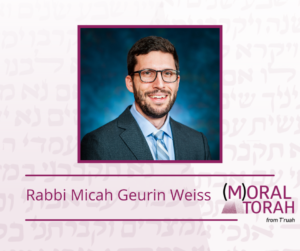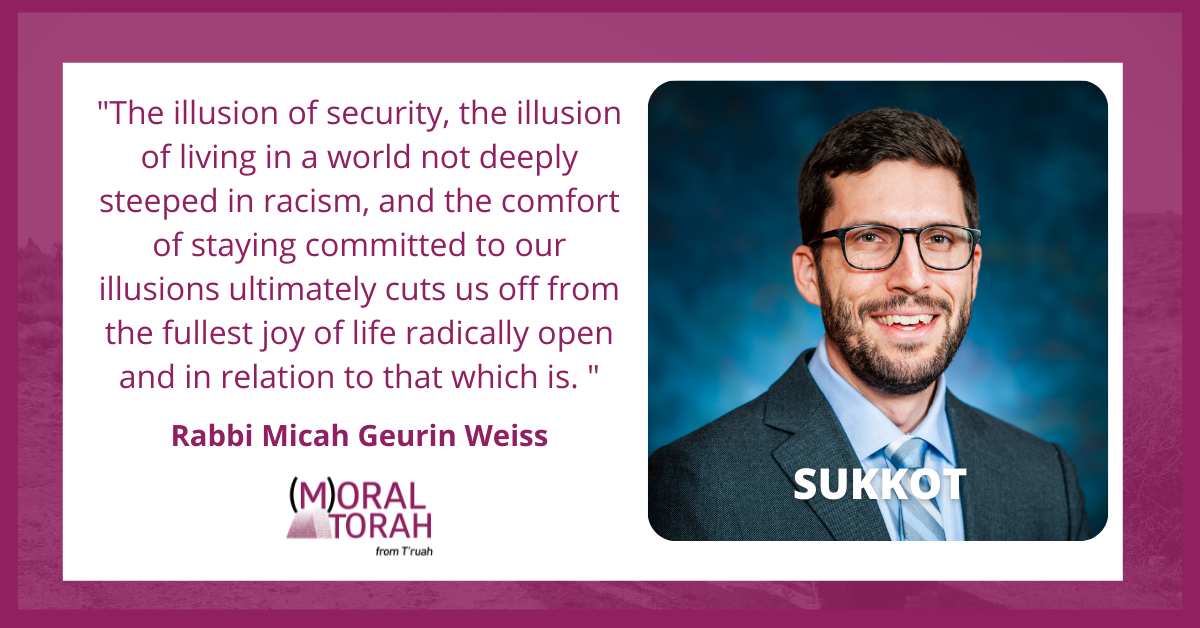A D’var Torah for Sukkot by Rabbi Micah Geurin Weiss
Many of my days are spent disappointing white Jews and making them uncomfortable. In my racial justice consultation work with synagogues, the first thing white folks want to tell me about is all the awesome work they’ve been doing: The racial justice book club they started last summer, the d’var Torah the rabbi gave about teshuvah and racism last Yom Kippur, the relationship-building they’ve been doing with a local Black church, and the racial justice statement the board approved and put in the newsletter. I think these are all lovely projects and I’m glad to see them happening in Jewish communities. And, more often than not, they are projects are led by white folks, for white folks, in consultation with white folks, and are squarely within the comfort zone of the majority of white folks in the community. The conversation then goes in one of two directions: They either ask me for suggestions of what to do next and I name some things that start to make them uncomfortable, or they ask for help navigating a challenging situation where a racial justice initiative has made a bunch of people uncomfortable. Either way, it gets uncomfortable.
Discomfort is not a bad thing, especially when it comes to undoing racism. The comfort zone of most white folks is deeply entwined in the culture and structural systems of white supremacy. The inertia of racism is too strong for us to create any meaningful change while operating within a framework of unexamined existential comfort for white folk. That being said, forcing white folks into a place of too much discomfort is just as much a setup for failure.
Sign up to receive (M)oral Torah in your inbox each week.
My relationship to the sukkah is a helpful guide in the work of calibrating the discomfort of anti-racism work with white folks. The rabbis of the Talmud interpret the Torah’s commandment to dwell in sukkot for seven days (Leviticus 23:42) as meaning that we should relate to the sukkah as we do to our permanent dwelling (Sukkah 27a). All the normal things we do in our houses year-round, mainly eating and sleeping, we should do in the sukkah. For those of us lucky enough to have stable, warm, dry, secure permanent dwellings, the exposed, impermanent sukkah is going to be a lot less comfortable as a home. Those sources of discomfort are intentional, and we’re supposed to relate to them as if they are our home; exactly the right place we are supposed to be.
The timing of Sukkot reinforces this point. The Jewish people left Egypt in the month of Nissan, in the spring, and experienced the “clouds of divine glory” — the mythological sukkot that protected the Israelites in the desert — in a time where the weather is warming and people naturally leave their homes to be outdoors. But the festival of Sukkot was postponed until Tishrei, when the weather is becoming cooler and people are naturally returning to the warmth of their homes. The mitzvah of the sukkah intrinsically pushes us non-agrarian people away from convenience and into discomfort as a spiritual practice.
Some of the most common halakhic questions of dwelling in a sukkah relate to moderating discomfort: Should I eat in the sukkah if it’s raining? Do I have to sleep in the sukkah if it’s cold, or potentially dangerous? As with every good Jewish question, the answer is “it depends,” but the answer is never “you should be comfortable on Sukkot, no matter what,” and it’s also never “you have to stay in your sukkah, regardless of how uncomfortable it makes you.”
The challenge with this halakhic model of regulating discomfort is that it’s pretty lenient for the moments of discomfort that have the most potential for transformation. If you want to go eat inside when it’s drizzling, there’s plenty of halakhic ground to do so. So too with anti-racism work: There’s not much keeping white folks from packing up and moving back into the comfort of their racially privileged home when things get uncomfortable.
My experience with Sukkot is that I rarely make a solo choice of embracing discomfort. If I’m with friends, I’m more likely to stay in the sukkah when it starts to rain because we decide together to put on raincoats and enjoy getting a little wet. I rarely sleep in a sukkah alone, but I’m always down to sleep out when folks invite me to bring a sleeping bag and camp in the sukkah together. I’ve never slept in a sukkah in the snow, but on a chilly night in the sukkah, I’m inspired by tales of Eastern European Chassidim sleeping in the sukkah through a blizzard as the heat of their piety melted the snow around them. Our comfort zones and positionalities are calibrated differently. Each of our growth through discomfort will look different at different times, but there is much to be learned from one another’s examples.
Find more commentaries on Sukkot.
The lesson of the uncomfortable sukkah is not discomfort for the sake of discomfort. It’s discomfort for the sake of joy: “You shall rejoice in your festival… and have nothing but joy” (Deuteronomy 16:14-15). The illusion of security, the illusion of living in a world not deeply steeped in racism, and the comfort of staying committed to our illusions ultimately cuts us off from the fullest joy of life radically open and in relation to that which is.
As Rabbi Alan Lew z”l teaches:
In the sukkah, a house that is open to the world, a house that freely acknowledges that it cannot be the basis of our security…the illusion of protection falls away, and suddenly we are flush with our life, feeling our life, following our life, doing its dance, one step after another.
And when we speak of joy here, we are not speaking of fun. Joy is a deep release of the soul, and it includes death and pain. Joy is any feeling fully felt, any experience we give our whole being to. We are conditioned to choose pleasure and to reject pain, but the truth is, any moment of our life fully inhabited, any feeling fully felt, and any immersion in the full depth of life, can be the source of deep joy.” (This is Real and You Are Completely Unprepared pg. 267)
 The pathway to this joy begins in discomfort. In my first few years out of college, while working as a community organizer, I had an email signature that said “life begins at the end of your comfort zone.” My revised signature would now say, “the joy of change begins in a properly calibrated discomfort zone.”
The pathway to this joy begins in discomfort. In my first few years out of college, while working as a community organizer, I had an email signature that said “life begins at the end of your comfort zone.” My revised signature would now say, “the joy of change begins in a properly calibrated discomfort zone.”
Rabbi Micah Geurin Weiss is the Assistant Director for Thriving Communities and Tikkun Olam Specialist at Reconstructing Judaism. In his professional role, Micah works to support the day in and day out needs of synagogues in the Reconstructionist movement, specializing in congregation-based racial justice work.


